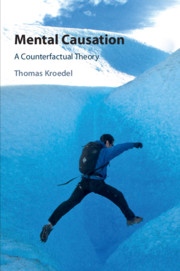What is going on in our minds has physical effects because it makes a difference to what is going on in the physical world. Generally, difference-making, or counterfactual dependence, suffices for causation. Both non-reductive physicalists and dualists can show that mental events make a difference to whether or not certain physical events occur. They can do so in the context of classical counterfactual approaches to causation by using the principle that counterfactual dependence is sufficient for causation. Alternatively, they can do so in the context of causal modelling theories by building a model that represents the patterns of difference-making that are true in a given case involving a (putative) mental cause. The model can be subjected to more sophisticated conditions for causation than simple counterfactual dependence, and the conclusion that there is mental causation emerges unscathed.
By appealing to the fact that the mind makes a difference, non-reductive physicalists and dualists can solve not merely the interaction problem but also the exclusion problem. If mental events are difference-making causes of physical effects, it does not follow that those effects are overdetermined by their mental causes and distinct physical causes, or at any rate it does not follow that cases of mental causation are similar to standard cases of overdetermination, such as firing squads, in any interesting respect.
In order to show that mental events make a difference to whether or not physical events occur, dualists have to assume that there are laws that relate mental and physical properties and that these laws could not have failed so easily as ordinary laws of nature. The resulting position, super-nomological dualism, is somewhat unorthodox and, as far as I know, has not been advocated before, but from a dualist perspective it seems worthwhile to adopt this position in order to be able to explain mental causation.
Non-reductive physicalists do not have to make any extra assumptions in order to secure the efficacy of the mental. As long as they assume that mental properties strongly supervene on physical properties, the result that mental events have physical effects follows. Some non-reductive physicalists have advocated positions stronger than the formulation in terms of strong supervenience that I have given here (see, e.g., Yablo Reference Yablo1992, Horgan Reference Horgan1993). Perhaps such a stronger formulation of non-reductive physicalism has other advantages, but if the arguments I have presented are sound, it is not needed for the purposes of making room for mental causation.
Thus, all prominent theories about the nature of mind can explain mental causation. (I have not mentioned reductive physicalists in a while, but it is clear that they can do so too.) This has repercussions for the philosophy of mind in general. Issues of mental causation have loomed large in the debate over the nature of mind. Worries that a certain theory might be committed to epiphenomenalism have been among the main reasons for rejecting that theory. In particular, the interaction problem has provided a main reason why people have rejected dualism, and the exclusion problem has provided a main reason why people have rejected non-reductive physicalism along with dualism. By showing that all the prominent theories about the nature of mind can accommodate mental causation, the account of mental causation by difference-making changes the dialectical situation. Issues of mental causation are taken out of the equation. Questions about the nature of mind will ultimately have to be decided on different grounds.

